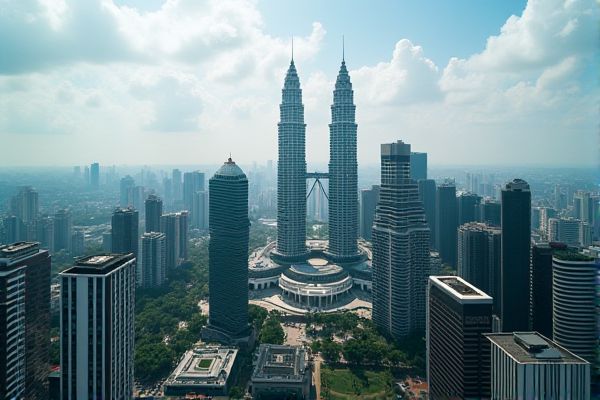
What to know as new resident in Malaysia: Multicultural society and diverse languages. Tropical climate; hot and humid. Cost-effective public transportation. Affordable healthcare system. Public holidays and festivals. Currency: Malaysian Ringgit (MYR). Wide range of cuisine options. Local laws and etiquette. Safety and crime rates. Internet and communication services.
Multicultural society and diverse languages.
In Malaysia, you'll encounter a multicultural society with over 137 languages, including the official language Malay (Bahasa Malaysia), English, and various indigenous languages like Iban and Sarawak Malay, reflecting the country's rich linguistic and cultural diversity. To learn more about this incredible aspect of Malaysia, visit the Guide to the Ethnic Languages of Malaysia on NordicTrans. This diversity is a testament to the blend of ethnic groups and traditions that have shaped the vibrant identity of Malaysia over the centuries.
Tropical climate; hot and humid.
Malaysia has a tropical climate characterized by hot and humid weather throughout the year, with temperatures ranging from 73°F to 91°F in coastal and lowland areas and cooler temperatures in the highlands. The country experiences wet and dry seasons, though these are often blurred, with significant rainfall and occasional typhoons, especially during the monsoon seasons from April to September and November to February. For more detailed information on the climate, you can visit Weather in Malaysia on Intrepid Travel's website.
Cost-effective public transportation.
In Malaysia, new residents can utilize the cost-effective MyTourist Pass, which offers access to all public transport modes including LRT, MRT, monorail, and buses, priced from 20 ringgit (US$4.54) for one day for Malaysians and 40 ringgit for foreigners. Additionally, the public transport system includes affordable options like the MRT, LRT, and bus services, with monthly travel passes and feeder bus systems to enhance connectivity and convenience.
Affordable healthcare system.
In Malaysia, the healthcare system is highly affordable, with the government subsidizing a significant portion of the costs through public facilities. Patients pay small fees, such as for a minor malady, a specialist consultation, and follow-up visits, and can also opt for comprehensive healthcare packages. For those seeking further details about the structure and benefits of the country's healthcare offerings, the comprehensive resources provided by International Insurance are invaluable. Patients can access these services and maintain their health without the burden of excessive costs, making Malaysia's healthcare both accessible and reliable.
Public holidays and festivals.
As a new resident in Malaysia, you should be aware of the diverse public holidays, including New Year's Day, Chinese New Year, Hari Raya Puasa, Labour Day, and Wesak Day, along with various state-specific and Islamic holidays that reflect the country's multicultural society. Additionally, Malaysia celebrates numerous festivals such as Thaipusam, Diwali, and the Malaysian Formula 1 Grand Prix, which are significant cultural and social events.
Currency: Malaysian Ringgit (MYR).
The Malaysian Ringgit (MYR) serves as the official currency of Malaysia, with each ringgit divided into 100 sen. The available banknotes are in denominations of 1, 5, 10, 20, 50, and 100 ringgit, and coins come in 5, 10, 20, and 50 sen. While credit and debit cards are generally accepted in urban centers and tourist spots, and ATMs are readily accessible, it is recommended not to exchange currency at airports or hotels. Instead, using local currency sources can provide the [best exchange rates](https://wise.com/gb/travel-money/malaysian-currency). By doing so, travelers ensure they receive better value for their money during their stay in Malaysia.
Wide range of cuisine options.
Malaysia offers a diverse and rich culinary landscape, influenced by Malay, Chinese, Indian, and indigenous traditions, featuring popular dishes like Nasi Lemak, Laksa, Satay, Char Kuey Teow, and a variety of noodle and seafood options, reflecting the country's multi-ethnic makeup and geographical influences. To explore more about these delectable offerings, visit the Two Together website, which delves into the fascinating fusion of flavors found in Malaysian cuisine.
Local laws and etiquette.
In Malaysia, it is crucial to respect local customs, such as removing shoes before entering homes or mosques, using the right hand for eating and passing objects, and dressing conservatively, especially in rural areas and mosques. Greetings should be respectful, with a light handshake or a bow, and addressing elders with titles like "uncle" or "auntie" to show deference. For further insights into these practices, Global Citizen offers a comprehensive guide that delves into the nuances of Malaysian cultural etiquette, aiding travelers and locals alike in navigating social interactions smoothly.
Safety and crime rates.
As a new resident in Malaysia, ensuring personal safety involves being conscious of various factors such as the choice of safe vehicles, avoiding overcrowded or top-heavy buses, and refraining from riding motorcycles or motorbike taxis due to their high accident rates. Safety measures should be complemented by an awareness of local laws, underscoring the need to dress modestly and carry necessary identification at all times. Despite a general decline in crime rates, with a crime index of 124.41 per 100,000 population as of 2020, certain crimes such as telecommunication fraud and purchase fraud remain significant concerns. Different regions exhibit varying crime rates, as seen in Selangor and Kuala Lumpur, which report higher instances of fraud. Additionally, when planning to drive, it is crucial to select [reputable transportation operators](https://wwwnc.cdc.gov/travel/destinations/traveler/none/malaysia) and secure the essential driving permits. Being mindful of road safety, particularly concerning buses, motorbikes, and piracy risks in specific waters, is vital for your safety and security while residing in Malaysia.
Internet and communication services.
As a new resident in Malaysia, you should be aware that the country has seen significant investments in its internet infrastructure, including the JENDELA plan to enhance fiber connections and mobile broadband speeds, as well as advancements in IPv6 adoption and routing security to improve internet resilience. Furthermore, [a new regulatory framework](https://www.connectontech.com/malaysia-licensing-of-social-media-and-internet-messaging-service-providers-from-1-january-2025-onwards/) requires social media and internet messaging services with eight million or more users in Malaysia to obtain an ASP(C) license starting from 1 January 2025. This initiative aims to create a safer online environment and regulate digital services more effectively, ensuring that the digital landscape is both robust and secure for all users.
